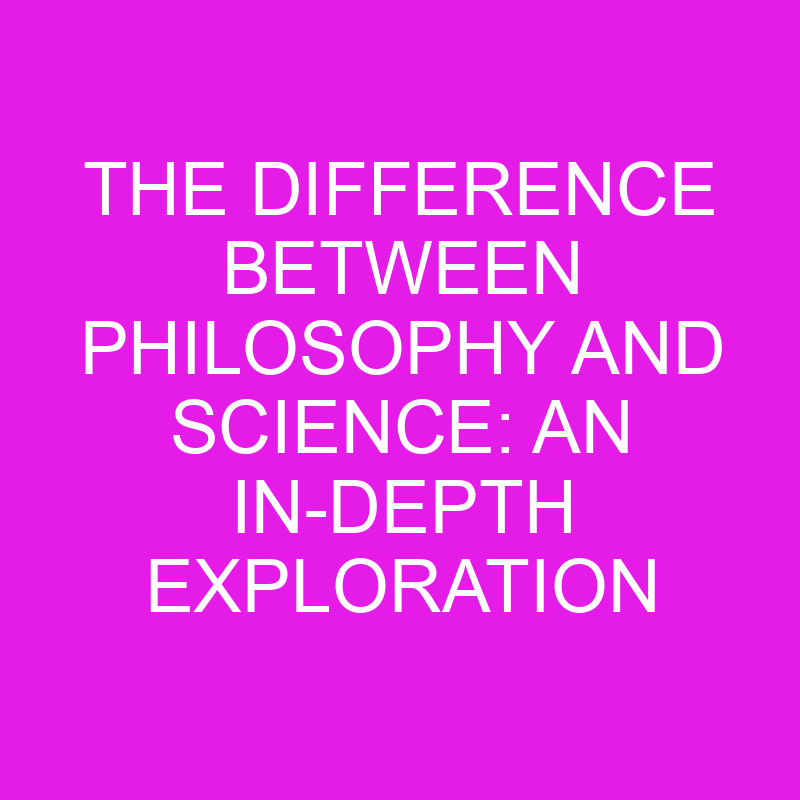
When it comes to exploring the mysteries of the world and seeking answers to life’s biggest questions, two disciplines often come to mind: philosophy and science. While both are dedicated to the pursuit of knowledge, they approach it from different angles. In this article, I’ll delve into the fascinating world of philosophy and science, highlighting the key differences between these two fields of study.
Philosophy, often considered the mother of all disciplines, is a branch of knowledge that dates back to ancient times. It involves a deep examination of fundamental concepts such as existence, reality, knowledge, and ethics. Philosophers engage in critical thinking and logical reasoning to analyze abstract ideas and ponder the nature of human existence. In contrast, science is a more empirical and evidence-based discipline that relies on observation, experimentation, and the scientific method to understand the natural world.
While philosophy and science may seem distinct, they share a common goal: the pursuit of truth and understanding. By exploring the differences between these two disciplines, we can gain a deeper appreciation for the diverse ways in which humans seek knowledge and make sense of the world around us. So, let’s embark on this intellectual journey and unravel the nuances that set philosophy and science apart.
Post Contents
- Key Takeaways
- Philosophy: An Examination of Fundamental Concepts
- Science: An Empirical and Evidence-Based Approach
- The Role of Critical Thinking in Philosophy
- The Scientific Method: A Systematic Approach in Science
- Differences in Methodology: Observation vs. Reasoning
- Overlapping Goals: The Pursuit of Truth and Understanding
- Conclusion
- Frequently Asked Questions
Key Takeaways
- Philosophy and science are two distinct disciplines that approach the pursuit of knowledge from different angles.
- Philosophy focuses on examining fundamental concepts and engaging in critical thinking and logical reasoning.
- Science, on the other hand, relies on empirical evidence, observation, and experimentation to understand the natural world.
- Despite their differences, both philosophy and science aim to pursue truth and understanding.
- Philosophy uses reasoning and contemplation to explore abstract concepts, while science relies on observation and the scientific method.
- The methodologies of philosophy and science intersect in their common goal of expanding knowledge and stimulating critical thinking.
Philosophy: An Examination of Fundamental Concepts
When it comes to seeking knowledge and understanding, philosophy plays a crucial role. As a discipline that dates back to ancient times, philosophy involves examining fundamental concepts through critical thinking and logical reasoning. It delves into questions about the nature of reality, the existence of knowledge, and the meaning of life.
One of the key aspects of philosophy is its focus on asking profound questions. By engaging in deep introspection and contemplation, philosophers aim to explore complex ideas and challenge conventional wisdom. For example, philosophical inquiries may revolve around the concept of free will, the nature of consciousness, or the existence of God.
Critical thinking is at the core of philosophical inquiry. Rather than accepting ideas at face value, philosophers strive to analyze arguments, identify inconsistencies, and evaluate evidence. This rigorous process helps to refine and shape our understanding of the world.
Unlike science, which relies on empirical evidence, philosophy seeks knowledge through reasoning alone. While this may seem abstract to some, it allows for the exploration of topics that may not be easily measurable or observable. Philosophers engage in thought experiments and consider hypothetical scenarios to explore ethical dilemmas or conceptual paradoxes.
Philosophy also encompasses various branches such as metaphysics, ethics, epistemology, and logic. Each branch addresses specific aspects of existence, morality, knowledge, and reasoning, adding depth and breadth to philosophical exploration.
Philosophy offers a unique approach to understanding the world by examining fundamental concepts through critical thinking and logical reasoning. It encourages us to ponder deep questions and challenges our assumptions. While it may not rely on empirical evidence like science, philosophy still plays an essential role in expanding our knowledge and exploring the complexities of the human experience.
Science: An Empirical and Evidence-Based Approach
Science is a field that relies on empirical and evidence-based methods to seek knowledge and understanding. Unlike philosophy, which uses reasoning alone, science uses observation, experimentation, and data analysis to explore and explain the natural world. It focuses on gathering evidence, testing hypotheses, and replicating experiments to arrive at reliable conclusions.
One of the key characteristics of science is its emphasis on objectivity. Scientists strive to minimize bias and subjectivity by following strict methodologies and peer-review processes. This ensures that scientific findings are based on reliable evidence and can be independently verified. By employing rigorous methods, scientists aim to uncover truths and explanations that are universally applicable, regardless of personal beliefs or perspectives.
Another important aspect of science is its reliance on empirical data. Through careful observation and measurement, scientists collect data that can be analyzed and interpreted. This data provides the foundation for developing theories and models that explain natural phenomena. These theories are constantly refined and updated as new evidence emerges, allowing science to evolve and adapt to our growing understanding of the world.
Science encompasses a wide range of disciplines, each with its own methodologies and techniques. From physics to biology, chemistry to psychology, the scientific approach is applied across various fields to explore and discover the underlying principles of the universe. This interdisciplinary nature of science allows for collaboration and the integration of knowledge from different areas, leading to further advancements and breakthroughs.
Science is an empirical and evidence-based approach to seeking knowledge and understanding. It relies on observation, experimentation, and data analysis to arrive at reliable conclusions. By following strict methodologies and emphasizing objectivity, science aims to uncover universal truths that can be independently verified. The interdisciplinary nature of science allows for collaboration and a deeper understanding of the natural world.
The Role of Critical Thinking in Philosophy
In philosophy, critical thinking is essential. It is the process of skillfully analyzing and evaluating arguments, ideas, and beliefs. Critical thinking allows philosophers to examine the logical coherence, consistency, and validity of an argument. By employing logical reasoning, philosophers can uncover hidden assumptions, identify inconsistencies, and challenge flawed reasoning.
Through critical thinking, I engage in deep introspection and contemplation to explore complex ideas and challenge conventional wisdom. I carefully evaluate evidence and reasoning to arrive at informed conclusions. This analytical and rigorous approach is crucial for philosophical inquiry, as it helps me develop a deeper understanding of fundamental concepts and their implications.
Critical thinking enables me to navigate through intricate philosophical debates and understand various viewpoints. By scrutinizing arguments and evidence, I can assess their strengths and weaknesses. This allows me to construct well-reasoned rebuttals and contribute to the ongoing philosophical discourse.
Moreover, critical thinking in philosophy extends beyond mere analysis. It encourages me to develop my own ideas and interpretations, fostering intellectual independence and creativity. By questioning assumptions and exploring alternative perspectives, I can uncover new insights and expand the boundaries of knowledge.
Unlike science, which relies heavily on empirical data and experimentation, philosophy seeks knowledge through reasoning alone. This allows for the exploration of abstract and conceptual topics that may not be easily measurable or observable. By employing critical thinking, philosophers can navigate through the complexities of ethical dilemmas, metaphysical inquiries, and questions of knowledge and existence.
Critical thinking plays a central role in philosophy. It equips me with the tools to analyze, evaluate, and construct arguments with clarity and precision. By employing logical reasoning and introspection, I can delve into complex philosophical concepts and challenge assumptions. This constant questioning and examination are what drive philosophical inquiry and foster a deeper understanding of the world around us.
The Scientific Method: A Systematic Approach in Science
In the world of science, the scientific method is a cornerstone. It provides a systematic approach to studying and understanding the natural world. As a scientist, I rely on the scientific method to guide my research and investigations. Let’s dive into the key aspects of the scientific method and how it sets science apart from philosophy.
Observation: The scientific method begins with making careful observations of the natural world. Through keen observation, scientists identify patterns, phenomena, and interesting questions worth exploring further. These observations serve as the starting point for scientific inquiry.
Research Question: Once an observation is made, a research question is formulated. This question guides the entire scientific investigation and sets the goal of the study. It helps to define the problem and the specific aspects that the scientist aims to investigate.
Hypothesis: A hypothesis is an educated guess or a possible explanation for the natural phenomenon being studied. It is based on existing knowledge, observations, and past research. The hypothesis should be testable and falsifiable, allowing for experimentation to either support or reject it.
Experimentation and Data Collection: The next step in the scientific method is to design and conduct experiments to gather data. Through carefully controlled experiments, scientists collect empirical evidence to support or refute their hypothesis. This data is often quantitative and objective, allowing for analysis and drawing conclusions.
Analysis and Interpretation: Once the data is collected, it is analyzed using statistical methods and other tools. The analysis helps to uncover patterns, relationships, and trends within the data. These findings are interpreted and used to draw meaningful conclusions about the research question.
Conclusion: Finally, based on the data analysis and interpretation, scientists draw conclusions that address the original research question. The conclusion of a scientific investigation is backed by evidence and is subject to peer review, ensuring rigor and reliability in the scientific community.
The scientific method offers a systematic and objective approach to understanding the natural world. It allows scientists to build on previous knowledge, test theories, and generate new knowledge through empirical evidence. While philosophy seeks knowledge through reasoning and contemplation alone, science employs the rigorous methodology of the scientific method. This methodological approach sets science apart by emphasizing empirical evidence, experimentation, and an objective evaluation of hypotheses.
Differences in Methodology: Observation vs. Reasoning
As I delve deeper into the discussion of the differences between philosophy and science, it’s important to explore the contrasting methodologies that these disciplines employ. One key distinction lies in the way they approach the acquisition of knowledge – observation and reasoning.
Philosophy: The Power of Reasoning
In philosophy, reasoning takes precedence as the primary methodology. Philosophers rely on their intellectual capacity to think critically and engage in logical analysis to understand the complexities of the world. By examining abstract concepts and ideas, they seek to broaden our understanding of fundamental truths and principles.
Philosophers use rational thinking and deductive reasoning to explore questions that cannot be answered through empirical observation alone. They strive to uncover deep insights into the nature of reality, ethics, and existence by leveraging their intuitive reasoning abilities. The tools of philosophy – logic, argumentation, and robust debate – provide philosophers with the means to evaluate and assess various perspectives and arguments.
Science: The Power of Observation
Science, on the other hand, adopts a methodology centered around observation. Scientists meticulously observe the natural world, conducting careful experiments to gather data that can be studied and analyzed. This empirical approach allows them to formulate testable hypotheses and draw measurable conclusions based on the evidence they gather.
With the scientific method, scientists harness the power of experimentation, ensuring that their findings are grounded in concrete evidence. They aim to uncover patterns, explain phenomena, and develop predictive models that can be tested and replicated.
While philosophy relies heavily on reasoning and critical thinking, science places a strong emphasis on empirical evidence and objective evaluation. It aims to provide us with a systematic and reliable understanding of the natural world, allowing for advancements in medicine, technology, and various fields.
Philosophy and science diverge in their methodologies, with philosophy deploying the power of reasoning and critical thinking to explore abstract concepts, and science relying on observation and experimentation to understand the natural world. These different approaches ultimately contribute to the distinct roles and contributions of each discipline in the pursuit of knowledge.
Overlapping Goals: The Pursuit of Truth and Understanding
In both philosophy and science, the ultimate goal is the pursuit of truth and a deeper understanding of the world around us. While their methodologies may differ, they share the common objective of unraveling the mysteries of existence.
Philosophy, with its emphasis on critical thinking and reasoning, delves into abstract concepts and fundamental truths. Philosophers engage in deep introspection and contemplation to explore complex ideas, challenge conventional wisdom, and unveil the underlying principles governing our existence. By questioning assumptions and analyzing arguments, philosophers aim to gain insight into the nature of reality, morality, consciousness, and the human experience.
Science, on the other hand, takes a more empirical approach to uncovering truth. Through careful observation, experimentation, and data analysis, scientists strive to formulate testable hypotheses and draw meaningful conclusions about the natural world. By systematically studying phenomena and collecting evidence, scientific inquiry seeks to provide reliable and measurable explanations for natural phenomena, leading to technological advancements and a deeper understanding of the universe.
Despite their differing methodologies, philosophy and science often intersect in their pursuit of truth and understanding. Philosophy’s role in providing the groundwork and framework for scientific inquiry cannot be overstated. It poses critical questions, challenges assumptions, and offers new perspectives that drive scientific progress. Additionally, philosophy constantly evaluates the ethical and moral implications of scientific advancements, ensuring that science remains aligned with human values and societal well-being.
While philosophy and science may approach knowledge from different angles, their mutual pursuit of truth and understanding ultimately benefits humanity by expanding our knowledge, stimulating critical thinking, and promoting intellectual growth. By recognizing and appreciating the overlapping goals of philosophy and science, we can foster a more holistic and comprehensive approach to the pursuit of knowledge.
Conclusion
Philosophy and science are two distinct disciplines that approach the pursuit of knowledge in different ways. Philosophy relies on critical thinking, reasoning, and logical analysis to explore abstract concepts and fundamental truths. On the other hand, science adopts a systematic methodology centered around observation, experimentation, and empirical evidence to understand the natural world.
While philosophy and science have different methodologies, they share a common goal: the pursuit of truth and understanding. Philosophy provides the groundwork and framework for scientific inquiry by posing critical questions, challenging assumptions, and offering new perspectives. It also evaluates the ethical and moral implications of scientific advancements, ensuring that science remains aligned with human values and societal well-being.
By recognizing the overlapping goals of philosophy and science, we can foster a more holistic and comprehensive approach to the pursuit of knowledge. Both disciplines play a vital role in expanding our understanding of the world and addressing complex questions about existence. Embracing the strengths of philosophy and science can lead to a deeper appreciation of the complexities of knowledge and a more comprehensive understanding of the world we live in.
Frequently Asked Questions
Q: What is philosophy?
A: Philosophy is the study of fundamental concepts through critical thinking and logical reasoning. It dates back to ancient times and involves deep introspection and contemplation to explore complex ideas and challenge conventional wisdom.
Q: Why is critical thinking important in philosophy?
A: Critical thinking is essential in philosophy as it allows for the skillful analysis and evaluation of arguments, ideas, and beliefs. It helps philosophers examine the logical coherence, consistency, and validity of an argument, and fosters intellectual independence and creativity.
Q: How does philosophy differ from science?
A: Philosophy seeks knowledge through reasoning alone, exploring abstract concepts and challenging assumptions. Science, on the other hand, relies on observation, experimentation, and empirical evidence to provide a systematic and reliable understanding of the natural world.
Q: What are the overlapping goals of philosophy and science?
A: Both philosophy and science share the common objective of pursuing truth and understanding. Philosophy offers critical questions, challenges assumptions, and evaluates the ethical and moral implications of scientific advancements, ensuring science remains aligned with societal well-being.






